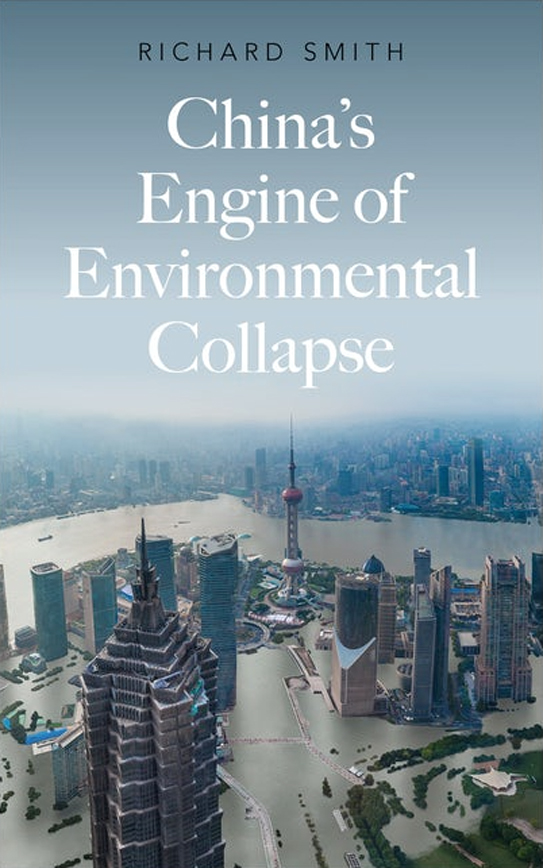China
China’s Engine of Environmental Collapse
Online: Zoom link will be provided to registered participantsAs the world hurtles towards environmental oblivion, China is leading the charge. The nation's CO2 emissions are more than twice those of the US with a GDP just two-thirds as large. China leads the world in renewable energy yet it is building new coal-fired power plants faster than renewables. Richard contends that nothing short of drastic shutdowns and the scaling back of polluting industries, especially in China and the US, will suffice to slash greenhouse gas emissions enough to prevent climate catastrophe.
Matters of State: Literature & Espionage
Online: Zoom link will be provided to registered participantsWHY SPY NOVELS? Spy novels emerged as a distinct genre around the time of World War I, coinciding with the creation of formal intelligence agencies in many countries. This was a period characterized by heightened concern on the part of rulers about national security, imperial strength, and the impending conflict of the Great War. Spy novels from the early twentieth century reflect these concerns, and generally feature secret agents and seemingly realistic tales of international intrigue. With the rise of fascism, spy novels shifted their focus to examine the dynamics of political movements within individual states, assessing their threats to the stability of the international political order. In these stories, the anxiety over the powerlessness of the individual is assuaged by the resourcefulness and ultimate success of exceptional or lucky individuals in confronting such harrowing problems as war, nuclear proliferation, and terrorism.
Matters of State: Literature & Espionage
Online: Zoom link will be provided to registered participantsWHY SPY NOVELS? Spy novels emerged as a distinct genre around the time of World War I, coinciding with the creation of formal intelligence agencies in many countries. This was a period characterized by heightened concern on the part of rulers about national security, imperial strength, and the impending conflict of the Great War. Spy novels from the early twentieth century reflect these concerns, and generally feature secret agents and seemingly realistic tales of international intrigue. With the rise of fascism, spy novels shifted their focus to examine the dynamics of political movements within individual states, assessing their threats to the stability of the international political order. In these stories, the anxiety over the powerlessness of the individual is assuaged by the resourcefulness and ultimate success of exceptional or lucky individuals in confronting such harrowing problems as war, nuclear proliferation, and terrorism.
Matters of State: Literature & Espionage
Online: Zoom link will be provided to registered participantsWHY SPY NOVELS? Spy novels emerged as a distinct genre around the time of World War I, coinciding with the creation of formal intelligence agencies in many countries. This was a period characterized by heightened concern on the part of rulers about national security, imperial strength, and the impending conflict of the Great War. Spy novels from the early twentieth century reflect these concerns, and generally feature secret agents and seemingly realistic tales of international intrigue. With the rise of fascism, spy novels shifted their focus to examine the dynamics of political movements within individual states, assessing their threats to the stability of the international political order. In these stories, the anxiety over the powerlessness of the individual is assuaged by the resourcefulness and ultimate success of exceptional or lucky individuals in confronting such harrowing problems as war, nuclear proliferation, and terrorism.
Matters of State: Literature & Espionage
Online: Zoom link will be provided to registered participantsWHY SPY NOVELS? Spy novels emerged as a distinct genre around the time of World War I, coinciding with the creation of formal intelligence agencies in many countries. This was a period characterized by heightened concern on the part of rulers about national security, imperial strength, and the impending conflict of the Great War. Spy novels from the early twentieth century reflect these concerns, and generally feature secret agents and seemingly realistic tales of international intrigue. With the rise of fascism, spy novels shifted their focus to examine the dynamics of political movements within individual states, assessing their threats to the stability of the international political order. In these stories, the anxiety over the powerlessness of the individual is assuaged by the resourcefulness and ultimate success of exceptional or lucky individuals in confronting such harrowing problems as war, nuclear proliferation, and terrorism.
Matters of State: Literature & Espionage
Online: Zoom link will be provided to registered participantsWHY SPY NOVELS? Spy novels emerged as a distinct genre around the time of World War I, coinciding with the creation of formal intelligence agencies in many countries. This was a period characterized by heightened concern on the part of rulers about national security, imperial strength, and the impending conflict of the Great War. Spy novels from the early twentieth century reflect these concerns, and generally feature secret agents and seemingly realistic tales of international intrigue. With the rise of fascism, spy novels shifted their focus to examine the dynamics of political movements within individual states, assessing their threats to the stability of the international political order. In these stories, the anxiety over the powerlessness of the individual is assuaged by the resourcefulness and ultimate success of exceptional or lucky individuals in confronting such harrowing problems as war, nuclear proliferation, and terrorism.
Matters of State: Literature & Espionage
Online: Zoom link will be provided to registered participantsWHY SPY NOVELS? Spy novels emerged as a distinct genre around the time of World War I, coinciding with the creation of formal intelligence agencies in many countries. This was a period characterized by heightened concern on the part of rulers about national security, imperial strength, and the impending conflict of the Great War. Spy novels from the early twentieth century reflect these concerns, and generally feature secret agents and seemingly realistic tales of international intrigue. With the rise of fascism, spy novels shifted their focus to examine the dynamics of political movements within individual states, assessing their threats to the stability of the international political order. In these stories, the anxiety over the powerlessness of the individual is assuaged by the resourcefulness and ultimate success of exceptional or lucky individuals in confronting such harrowing problems as war, nuclear proliferation, and terrorism.
Matters of State: Literature & Espionage
Online: Zoom link will be provided to registered participantsWHY SPY NOVELS? Spy novels emerged as a distinct genre around the time of World War I, coinciding with the creation of formal intelligence agencies in many countries. This was a period characterized by heightened concern on the part of rulers about national security, imperial strength, and the impending conflict of the Great War. Spy novels from the early twentieth century reflect these concerns, and generally feature secret agents and seemingly realistic tales of international intrigue. With the rise of fascism, spy novels shifted their focus to examine the dynamics of political movements within individual states, assessing their threats to the stability of the international political order. In these stories, the anxiety over the powerlessness of the individual is assuaged by the resourcefulness and ultimate success of exceptional or lucky individuals in confronting such harrowing problems as war, nuclear proliferation, and terrorism.
Looking Over the Abyss with Steven Colatrella and Michael Meeropol
Online: Zoom link will be provided to registered participantsEurope and subsequently the United States rose to power and wealth along with the rise of capitalism. But capitalism has now shifted its attention to Asia, even as the conditions of ordinary workers in Europe and North America decline, and the political influence of the West wanes. Looking Over the Abyss argues that only by breaking decisively with capitalism, and aligning themselves with the majority of the world’s people against exploitation, can the peoples of Europe and the United States save their societies.



